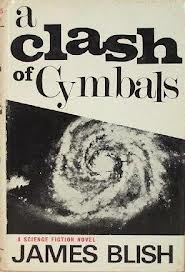(A Clash Of Cymbals was the Faber & Faber edition of The Triumph Of Time.)
In The Triumph Of Time (Cities In Flight, London, 1981, p. 506), Dr Schloss says that, philosophically, either the universe will end or it will not. If it is going to end, then all that remains is to fix the date and, in the novel, the Hevians have begun to do this. He adds that cyclical theories are hedges.
If that is the case, then the entire novel is a hedge because the characters immediately pass from discussing the end of time itself to discussing an unexpected catastrophe at the midpoint of a cosmic cycle. However, on reflection, I see their point.
We must distinguish between:
(i) any ending, eg, an individual death, the fall of a civilisation, the end of all life on Earth etc;
(ii) the heat death of the universe, cosmic quiescence, when all the energy has run downhill and cannot (?) be made to run back up again;
(iii) a cessation of all existence.
Conservation laws teach us to expect (ii) though not (iii). Life teaches us to expect many cases of (i), ultimately, for each of us, our own individual deaths.
In the novel, the expected collision between matter and anti-matter universes is neither (iii) nor even (ii) but a spectacular example of (i). Matter will not cease to exist but will be transformed into energy on a scale to dwarf even the monobloc (p. 515). Because all the energy will remain not only existent but also extremely active, this event is not the heat death of the universe but must be midway between the monobloc and the heat death.
However, it is certainly an end to all life, consciousness, civilisation, organised matter and historical records - except that the interstellar empire called the Web of Hercules, by controlling matter-anti-matter interactions, does manage to leave a record. Blish has already quoted from a subsequent history of the Milky Way so would be contradicting himself if he did not explain the existence of this history.

No comments:
Post a Comment